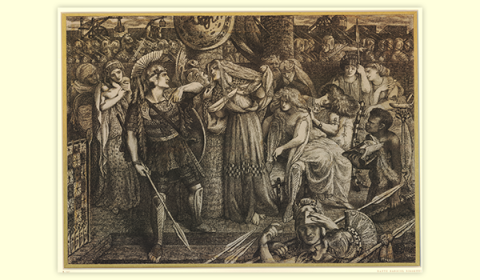
The McManus: Dundee's Art Gallery & Museum
Thursday 19 May - Sunday 14 August 2022
A British Museum Spotlight Loan Troy: beauty and heroism is going on show at The McManus: Dundee's Art Gallery & Museum from Thursday 19 May until Sunday 14 August 2022. Key objects from the Troy: myth and reality exhibition will be accessible to audiences as part of the British Museum's National Programmes. Complementing objects from the British Museum will be loans of casts of sculpture from Duncan of Jordanstone College of Art and Design and the University of Dundee. Objects from Dundee City Council's own collections will also be featured.
Helen and Achilles are central characters in the story of the Trojan War. Helen is the most beautiful woman in the world. Her abduction triggers the ten-year war, while Achilles' short but glorious life is the tale of one of the greatest Greek heroes. Each is a fascinating and complex figure.
Focusing on significant moments from the lives of Helen and Achilles through the themes of beauty and heroism, four objects have toured Reading and Surrey. They will now visit Dundee, as the only Scottish venue of the tour, until August 2022.
A British Museum Spotlight Loan Troy: beauty and heroism features an Etruscan urn, never been on loan before, portraying Helen's abduction by the Trojan prince Paris, while an Athenian amphora shows the brutal side of Achilles. Supplementing these ancient objects are artworks by Dante Gabriel Rossetti (1828–1882) and Pietro Testa (1612–1650). This touring show will convey key events in the story of the Trojan War that define the lives and character of these two figures, as interpreted by ancient and modern artists.
Continuing the legacy of the recent major Troy exhibition at The British Museum will be a 2,500-year-old, striking black-figure pot made in Athens and found at Vulci in Italy. The amphora is remarkably well preserved and portrays key figures from the Troy story. One side depicts the body of Trojan prince Hector dragged and defiled in revenge by Achilles for killing his lover Patroclus. By an error of drawing, Achilles appears with his upper body behind and legs in front of a mound, which represents the tomb of Patroclus. The other side of the amphora depicts the messenger god Hermes with the goddesses Athena and Aphrodite as they prepare for the Judgement of Paris, the Trojan prince who chose Helen as his prize, triggering the Trojan war.
An Etruscan funerary urn with exquisite detail dating from around 125BC–100BC also joins the tour from the major exhibition. Portraying Helen's embarkation for Troy, the young woman is led away from Greece by attendants. Loaded onto the ship alongside a vase, she seems to be just another piece of cargo, with Paris seated and looking at his prize.
Augmenting these two ancient objects will be Testa's ‘The birth and infancy of Achilles’ (c.1648-50), an exclusive addition to the Spotlight Loan and an object which has never been seen on tour before. Comprising a composite scene of episodes from Achilles' early life, the etching features his mother, the sea goddess Thetis, dipping the young Achilles into water from the river Styx in an attempt to make him immortal. Crucially, she holds him by the heel, leaving a vulnerable spot which will eventually kill him.
Rossetti's Cassandra (1861, reworked 1867) is another exclusive for the Spotlight Loan. A study for a painting that was never completed, it shows Helen surrounded by the Trojan characters whose lives are disrupted or cut short as a consequence of her relationship with Paris. Portraying the moments before Hector's doomed last fight, it dramatises the scene from the Trojan perspective. The drawing shows the prophetess Cassandra in anguish as the fate of her brother Hector looms. She has predicted his death but cannot prevent it, as she is destined never to be believed. Helen arms a carefree Paris for battle whilst he lounges; from her furious expression, it seems clear that Cassandra has condemned her actions. Paris, appearing amused by the situation, attempts to soothe Helen by patting her on the back. This is a less sympathetic interpretation of Helen, looking to the devastation she will cause.
In addition to objects from the British Museum will be loans of casts of sculpture from Duncan of Jordanstone College of Art and Design and the University of Dundee. Objects from Dundee City Council's own collections will also be displayed. These include a collection of Greek ceramics as well as objects from Naukratis. This was a Greek port city in Egypt, in the Nile Delta, Egyptians and Greeks lived here side by side practising their own customs and beliefs. WM Flinders Petrie rediscovered Naukratis in 1884. The objects he discovered were distributed to more than 70 museums around the world through the Egypt Exploration Fund. Since 2008, scholars from the British Museum have been working with museums which hold collections from Naukratis to draw together research and documentation from old excavations as well as conducting new fieldwork.
Moira Methven, Chair of Leisure & Culture Dundee said,
"Our partnerships are key to bringing quality exhibits to The McManus and this spotlight loan is a great example of how working together can bring exciting exhibitions to Dundee. We are grateful to The British Museum for working with us by bringing these loans to the City and allowing us the opportunity to complement them with interesting artefacts from our own collections."
Co-curator of the exhibition, Victoria Donnellan said,
"Following the success of the Troy exhibition at the British Museum, it is very gratifying to be able to bring an exciting selection of related objects to audiences around the UK thanks to the Museum's National Programmes. The ancient story of Helen and Achilles is a fascinating one and I'm so pleased we can portray the various facets of beauty and heroism through these rich objects."
A British Museum Spotlight Loan Troy: beauty and heroism is generously supported by the Dorset Foundation in memory of Harry M Weinrebe and admission is free.


